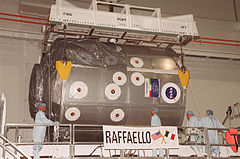Raffaello MPLM

Raffaello being prepared for flight on STS-100
|
|
| Operator | NASA |
|---|---|
| Website | NASA MPLM |
| Mission duration | ~2 weeks |
| Spacecraft properties | |
| Spacecraft | Raffaello |
| Spacecraft type | MPLM |
| Manufacturer | ASI |
| Dry mass | 4,082 kilograms (8,999 lb) |
| Orbital parameters | |
| Reference system | Geocentric |
| Regime | Low Earth |
| Inclination | 51.7° |
| Berthing | |
The Raffaello MPLM, also known as MPLM-2, was one of three Multi-Purpose Logistics Modules which were operated by NASA to transfer supplies and equipment to and from the International Space Station. Raffaello was used for four of twelve MPLM flights to the space station, with Leonardo being used for the remainder. It was first launched on 19 April 2001, aboard the STS-100 mission flown by Space Shuttle Endeavour, and made its third flight in July 2005, aboard Discovery on STS-114. For the last time, Raffaello was launched aboard Space Shuttle Atlantis on the STS-135 mission, the last flight of the Space Shuttle. As of June 2015, it is now being stored at the Kennedy Space Center.
Like the other Multi-Purpose Logistics Modules, Raffaello was constructed by the Italian Space Agency, who chose to name it after the painter and architect Raffaello Sanzio. The module was constructed in the late 1990s, and delivered to NASA at the Kennedy Space Center in August 1999.
...
Wikipedia
